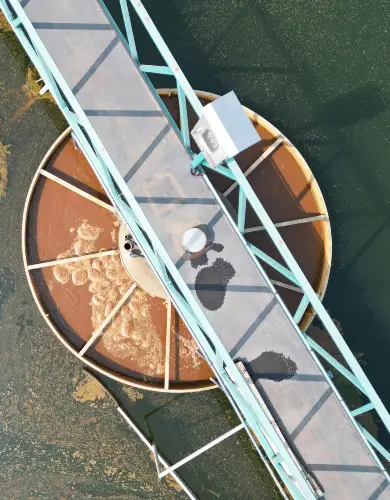Water abstraction | Sell your excess water
In the energy market, the idea of exporting electricity to the grid is very common. Businesses can purchase commercial solar panels and sell surplus electricity to the grid through the Smart Export Guarantee scheme.
The British water industry is on the verge of allowing businesses to sell drinkable water into the local water network.
Businesses that hold a licence to extract water from rivers, lakes, or aquifers (known as abstraction rights) may now have the opportunity to feed water directly into the local network.
This article explains the opportunity for businesses to monetise their water abstraction rights; we cover:
- What are water abstraction rights?
- The environmental advantage of using commercial water abstraction rights.
- Didcot Power Station: First example of selling water to the grid.
- Using your water abstraction rights to sell water back to the grid.
What are water abstraction rights?
The Environment Agency protects British rivers by controlling water extraction from rivers, streams, and aquifers by local water companies and other commercial activities.
If your business plans to extract more than 20 cubic metres a day from a local water source, you typically need an abstraction licence.
Large borehole water supplies or farms that use river water for irrigation are typical examples of businesses with an abstraction licence.
The Environment Agency carefully limits the number of water abstraction licences in areas of high water scarcity.
Commercial water abstraction rights can last up to 18 years, providing businesses with a long-term water resource. Changes in business activities can leave these abstraction rights underutilised.
The new plans under consideration will allow companies with underutilised abstraction rights to sell drinking water to the local grid.
The environmental advantage of using commercial water abstraction rights
Ofwat’s innovation fund has funded an exploration into allowing private water supplies into the British water infrastructure.
The potential of using commercial abstraction rights is being pursued to help the water industry tackle the growing issue of water scarcity in the South East of England.
Utilising water abstraction rights near urban areas in regions of high water scarcity has two key advantages that reduce the environmental impact of the water industry.
Firstly water has less distance to travel, meaning that less electricity is consumed in pumping water to end users. This reduces the carbon footprint associated with the water supply.
Travelling a shorter distance also avoids notoriously leaky British water infrastructure, reducing the overall water footprint associated with the industry.
Didcot Power Station: First example of selling water to the grid
The first example of a company pursuing selling water to the grid is the global energy company RWE. RWE holds an abstraction right to draw water from the River Thames at their Didcot Power Station, up to 20 Ml (around 8 Olympic swimming pools) per day.
Originally, the water abstraction was used by Didcot A and B gas-fired power stations.
💡Power generation is one of the industries that consumes the most water, with large quantities used to drive the turbines that generate electricity.
Following the demolition of Didcot A Power Station, RWE has been seeking ways to utilise its valuable water abstraction licence. One plan involves building a data centre at the site, which also requires large quantities of water.
RWE is working with Bristol Water on an innovative scheme to build a private water treatment plant nearby to produce drinkable water.
Business water supplier Castle Water has applied to Ofwat for a licence to purchase the water from RWE and sell it to their customers in the Thames region.
RWE’s water will utilise the existing Thames water pipe network to deliver it to Castle’s Thames Water business customers.
Castle Water’s licensing request is under consultation by Ofwat, with a decision expected in 2024.
Using your water abstraction rights to sell water back to the grid
In the Thames Water region, a cubic metre of potable water costs around £2 in both domestic and business water rates.
Underutilised abstraction rights offer a clear financial opportunity to sell water back to the grid.
Castle Water is starting to gather information from companies that are interested in utilising their abstraction rights.
They are looking for commercial sites that are:
- In England.
- Near to urban areas.
- Hold underutilised water abstraction rights.
Get in touch with Castle Water on their Tap into your water abstraction rights web page.

